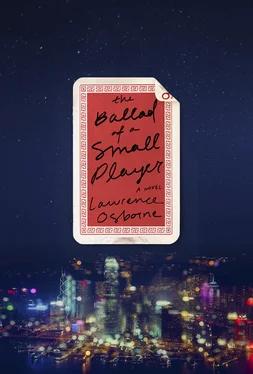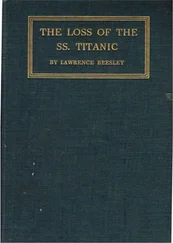We crammed into the elevator and I had not even intended to use the elevator. I was being carried along by the momentum and I wanted to escape. So down we went, with the camera rolling and the journalists jammering. I gave up telling them that I was not a lord. They wanted a lord and I was the lord. Word had gotten around so insistently that I was the lord that in the end I simply had to be the lord. As the lord I had to behave in a certain way, and it was a great deal more hassle to not behave in that way. So I saw now (as we came down into the lobby and a small crowd of curious onlookers pressed forward to get a glimpse of me) that sooner or later I would just get on with being the lord and that would be easier. The onlookers were gamers who had gotten the word, and since every big winner is a fifteen-minute celebrity in Casinoworld they had to see what the fuss was all about. They pressed around me and asked for autographs or tips or words of encouragement and advice and soon I was brought to a standstill as they formed a closed circle around the news crew.
“Lord Doyle,” the reporter continued to press, “are you planning to play tonight at one of the casinos? We’ve heard that you’ve been banned from playing at the Lisboa. Is that true?”
“No comment.”
“Lord Doyle, how does it feel to be an English millionaire in a Chinese city?”
“I am glad there are still English millionaires.”
I said it in Chinese, and the whole room laughed.
“Are you planning to leave Macau?”
“I’m a private citizen, and I am just as surprised by my good fortune as you are.”
“Lord Doyle,” a voice asked from the back of the crowd, “is it true the casinos are robbing us?”
“How would I know?”
“Because,” the reporter interjected, “your success seems to suggest it.”
A few voices rose up: “Yes! They’re robbing us!”
The crowd bubbled with an incoherent ill will toward the bosses who took all their money, and the epicenter of this ill will was a goodwill toward me. They practically cheered me as I pushed out onto the street, and the crew followed me with the foam boom hovering above my head. “Look,” I heard a voice cry behind us, “Lord Doyle is headed toward the Fortuna!” This was incorrect, and in fact as soon as I was in the street I hailed a cab and went to Coloane for lunch at Fernando’s on the windswept little beach across from the Hyatt. There I stayed all day eating asado and drinking gin and tonics and when dusk fell I staggered across the beach, through the tangled volleyball nets, to the imposing hotel, where I got myself a room for the night and spent half of it watching the English Premier League. I was sure that sooner or later my face would appear on TV as well, on one of the local channels, and as soon as it did it would be well nigh certain that Interpol would take an interest. At that moment, ironically, I would have to run.
The intricate cycles of the monsoons, which I have never understood, blew a storm across the bay that night and the cedars and pines shuddered under a veiled moon. I lay in bed burning hundred-dollar notes with a cigarette lighter to see if it would make me feel ill. The hotel was empty, funereal, and I walked through empty halls and empty restaurants where the usual Japanese and Hong Kongers were absent. Paranoia is often like this, and in an empty place we are sure that we are being watched. The waiters, the despondent staff, the idle cooks, they all follow one with their eyes. I sat in the bar upstairs, the one with a sea-view balcony, and I tried to construct a plan for myself. The reality was that the more money I made, the more trapped I felt. Should I play on and on until doomsday, until I started losing again and balance was restored? This is how a hardened gambler would think. It doesn’t matter to him, because what matters is the roller coaster, the wind in his hair, the thrill. He plays until he runs out of money.
When I got back to the Lisboa in the morning there was a bouquet of flowers for me in the room and a note from the management. They hoped I would stay on even if I could not play the tables. They had some nerve, but as it happened I had nowhere else to go and my suite was as good as I would get. They apologized for the intrusion from the press. From then on, they assured me, security would deal with it.
Why not, then? The suite was now full of money; bales of it, cases of it, dressers crammed with it. I kept some in the bathroom, some in the cupboards, and the big bills in the digital safe. I stored two cases in the overhead compartments of the armoire and another in the TV cabinet. The air smelled of it, that soft stale scent of human hand sweat and ATM rollers. Cash, the blood of life.
Eventually, having calmed myself with a vat of Kahlúa, my mind turned back to the prospect of the tables and I felt the subtle tug of my pleasure exerting itself once again. I was aware, of course, that the executives thought they were obeying mathematical laws when they permitted me to play on, whereas in fact they were succumbing to a classic case of gambler’s fallacy — that is, the fallacy that if deviations from expected behavior are observed in the short term, they must be balanced out by a different outcome in the long term.
This involves an assertion of negative correlation between trials of the random process. Take the example of tossing coins. The outcomes of each toss of a coin are statistically independent and the chances of getting heads, for example, on each toss is always ½. The probability of getting two heads in two tosses is ¼, and so on. If a player tossed five heads in a row, the probability of which is only 1/ 32, the other player might assume, according to the fallacy, that a tails is “due” pretty soon. This is incorrect. The probability of flipping twenty-one heads in a row is, in fact, 1 in 2,097,152, but the probability of flipping a head having already flipped twenty times is, surprise surprise, still only ½. That’s what the Chinese don’t understand, and now the bosses were thinking the same way. It was crass and understandable at the same time, because deep down they were sure that something unusual was on their doorstep, that the spirit world was speaking to them. They were thinking like locals, which is what human beings always do. They had simply put aside things that they knew perfectly well, that every rational person who studies gambling knows back to front. They knew that this was the theorem of Christiaan Huygens, well known to every amateur math geek and card sharp and casino operator worth his salt. Just as they knew that if two players start out with different amounts of money — say five cents and eight cents — the guy with five cents will always, in the long run, lose everything, all things being equal. But this they had not forgotten.
I was now fully aware that whichever casino I went into, I would be watched with maximum attentiveness. But at the same time I knew that they could not believe in my luck continuing because it struck them as irrational — whereas, as I have explained, it was neither rational nor irrational. Accordingly, once powdered and dried the following night — a Thursday, if I remember correctly — I assembled three hundred thousand in envelopes and prepared for battle. The boys from the front desk brought me up a white carnation for the buttonhole, wrapped not in foil but in sheet silver. It was a nice touch, but they needn’t have bothered, because in the end something more extraordinary happened.
Since I could wait no longer, feeling starved of my dirty baccarat, I decided to go to the Greek Mythology that evening and throw myself off a dirty little cliff and die. I didn’t give a damn, I was mou bian bei , as we say in the language, and I wanted if anything to commit baccarat suicide and flame out to the amazement and great concern of all present. What a death!
Читать дальше












